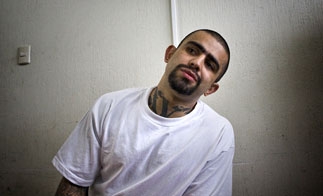A leader of the Barrio 18 gang in Guatemala told El Faro that the group would be interested in following the example of the gang truce in El Salvador and entering negotiations with the government.
Aldo Dupie, alias “Lobo,” is a leader of a “clica” of the Barrio 18 known as Solo Raperos which operates in the El Limon zone of Guatemala City. He is currently in solitary confinement in Fraijanes prison.
He told investigative site El Faro that Barrio 18 was interested in the possibility of holding negotiations with the Guatemalan government, and confirmed that they had sent people to El Salvador to find out more about the truce there. The Salvadoran branches of Mara Salvatrucha (MS-13) and Barrio 18 have agreed to cut down on violence, causing the homicide rate to fall by 60 percent in the last four months.
Lobo said that, in a deal, the group would want to get better conditions for imprisoned members, and job opportunities for those on the outside:
First, to improve the conditions for those who are here. … [at the moment] our families can come once a month, you understand me? We see our kids once a month.
And for our homies in the street … if they gave us work in the streets, if we had an income, do you think that I would be extorting?
However, he expressed reservations about holding talks with MS-13, saying he would not be able to sit at a table with them, as has been done in El Salvador.
Of course for us it’s better to talk to the government than with the other gang, because with the other gang we don’t gain anything, they just insult our mothers, but now with the government it is possible to talk seriously.
InSight Crime Analysis
Lobo’s interview with El Faro draws attention to the two alternative narratives of what is taking place in El Salvador. The arrangement was originally presented as a truce brokered by the Church between the two gangs, and the government denied that it was negotiating with them or had offered any concessions in exchange for the drop in violence. The gangs themselves presented the agreement in pious terms as the outcome of “a profound process of reflection,” saying that they only wished to contribute “to the good of the country,” and that “we have not negotiated anything with this government, nor do we ask to.”
The fact that Lobo openly states that there would be no point in talking to MS-13 because they couldn’t offer any benefits lays bare that what his branch of Barrio 18 is interested in is concessions from the government. As InSight Crime has noted, bargaining with criminal groups for a cut in homicides could set a dangerous precedent, encouraging gangs to threaten further violence if their demands are not met.
There has also been interest from the region’s governments in seeing whether the model of the truce could be exported. In May, Salvadoran Security Minister David Munguia Payes and truce negotiator Raul Mijango met with ministers from Honduras and Guatemala to discuss the truce. Honduran Security Minister Pompeyo Bonilla told press that the truce was “a lesson which deserves to be replicated, to attempt it in my country,” while Guatemalan Interior Minister Hector Mauricio Lopez said the deal was worth studying to see if it could be exported.
A representative of the Organization of American States (OAS) has said that one of the body’s intentions in visiting El Salvador and meeting with gang leaders was to see if the truce could be exported.
One thing that could stand in the way of this is that the dynamics of violence are different in each of the three “Northern Triangle” countries. As El Faro pointed out during the interview with Lobo, Barrio 18 in El Salvador is split into two factions. These kind of differences, along with the presence of other criminal players in each country, could mean the truce is not easily transferable.

